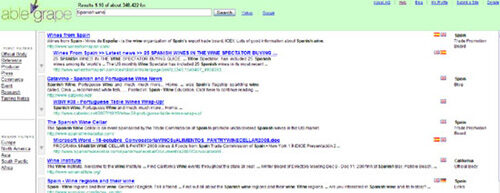I’ve never really understood why these niche search engines keep cropping up until now…and it involves one of my favorite things in the world. Yes, it’s wine. Glorious, spellbinding wine.
Doug Cook, a former search executive at Inktomi (for those of you who’ve been in the industry more than a few years, you’ll remember them fondly) and Yahoo has just rolled out the beta of Able Grape, a search engine that scours wine sites. The database already contains almost 10 million pages. To use this engine properly, you don’t need to add the usual wine-related terms that would normally be necessary in a regular engine like Google. The example given on the Able Grape website clarifies this point:
“While you need to type Spanish Wine on Google to get good results, on Able Grape, you will get better results than Google by simply typing Spain. Similarly, instead of needing to type Argyle Winery or Argyle Vineyards to get just wine-related results, try simply Argyle. And instead of climate change and wine, try simply climate change. (We have included some great general resources about climate change, but you’ll find that most of the results are wine-specific. Moreover, Able Grape knows that global warming and even cambiamento climatico mean the same thing).”
How successful will a niche engine like this be, if users need to use different search terminology than they would on a traditional engine like Google or Yahoo? There’s no convenient toolbar (yet) and unless users read the bit about how to best use the engine, they may not get the best results.
A search for “Spanish wine” on Able Grape reveals this: and in case you can’t see it there were 348,422 results returned.
A search for “Spain” on Able Grape reveals this: and again if you can’t see it, there were 645,402 results returned.
The recommended “Spain” search gives the user almost twice the amount of results as the search for “Spanish wine.” Obviously, if you learn how to properly use the engine, you’re going to get the best results. Now, the previous example isn’t the best one to use for why Able Grape is better than Google but think about this one:
“If we type in “Barbera,” we don’t want to know about “Hanna.””
For those of you who don’t know, and I counted myself amongst that group until just a minute ago, “Barbera” refers to an Italian red wine grape variety. If you do a search in Google, the first result returned actually is one for the wine, but most of the other results on the first page deal with non-wine Barbera entries. Bypassing Google and going straight to a niche engine is definitely going to prevent you from having to weed out all those irrelevant results. However, if you have the convenient Google toolbar with the handy dandy search box on your browser at all times, are you going to actually go to another engine like Able Grape? Or are you going to simply take your chances and quickly skim over all of the irrelevant results that are provided? That isn’t too difficult, honestly, and if it’s a choice between letting an engine filter out so-called irrelevancies or doing it myself, I’ll take my chances since I’m a massive control freak.
I am definitely not suggesting that niche engines are a bad thing, of course, but I have to wonder about their popularity. I love wine and buy it often, but if I am looking up a bottle to see how it rates, I’m going to use Google because that’s my default engine. The time it takes to go to a niche engine is time that I could be spending on uncorking that sucker at home you know.
There are a ton of other niche search engines, and I’ve written about them before on this very blog. However, what’s not previously been explored (at least not by the SEO Chicks) is how you can use these engines to your advantage from an SEO’s perspective, NOT from a user’s perspective. How, exactly, does one go about being listed and performing well in one of these engines? Since Google, Yahoo, and MSN all like different things, why would a niche engine be any different? Will optimizing for a niche engine cause you any harm in the main three engines? There isn’t that much information out there about this, unfortunately, at least not that I could find during my 5 minutes of digging. OK that’s a complete joke. I spent a full hour of my valuable time trying to search for data on what these types of engines look for in a site, how they determine the most relevant results…and I’ve come up about as empty as my current wine glass.
As much as Google annoys me, it’s fairly easy to understand their guidelines. The same holds true for the other two engines as well. With such a large presence on the web, there is a literal ton of data out there that tells you how to do well in these engines, what to do and what NOT to do, etc. This isn’t the case, at least not yet, for most of the niche engines. Obviously, in the case of Able Grape, wine-related sites will be the ones that are indexed in the database, but what factors influence the order of their SERPs? If these niche engines want to grow, will they have to drum up this type of information for us, so that we can all try and conquer yet another engine? My head is splitting, and it’s not just from the seriously poor chianti. What’s the future, then, of small engines of any sort? Do they have any chance at all against the big three? Is it possible for me to ask more questions in this post?





